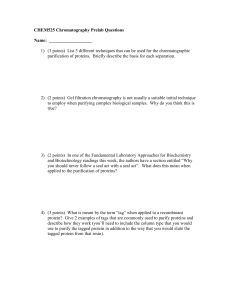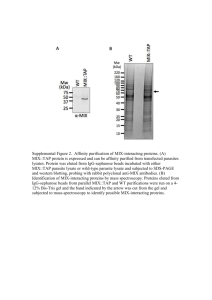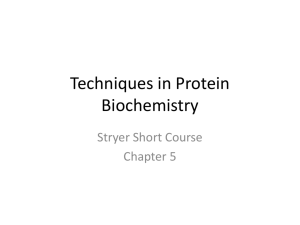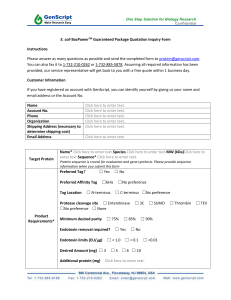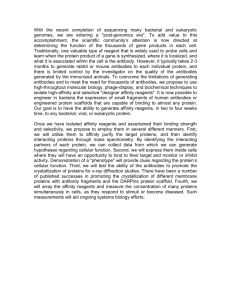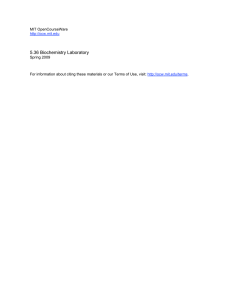Lac Operon
advertisement
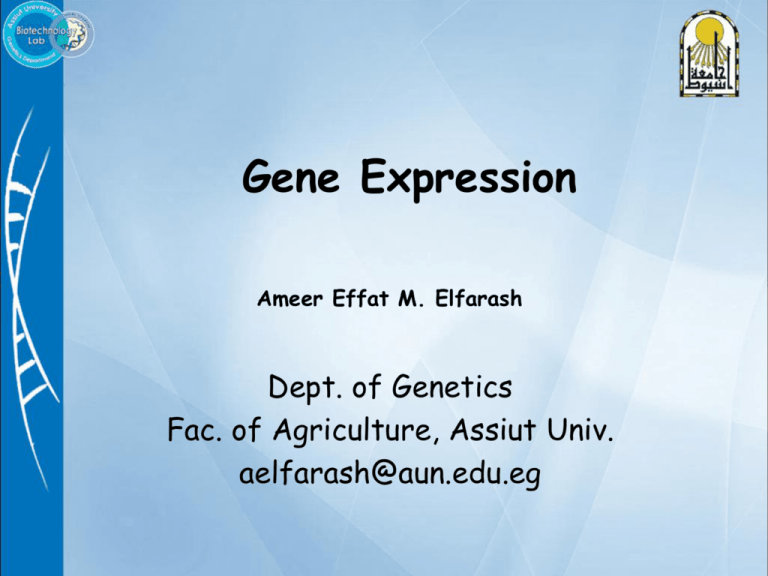
Gene Expression Ameer Effat M. Elfarash Dept. of Genetics Fac. of Agriculture, Assiut Univ. aelfarash@aun.edu.eg Initiation The Process of Translation The Process of Translation The Process of Translation The Process of Translation The Process of Translation The Process of Translation The Process of Translation The Regulation of Gene Expression • Constitutive genes are expressed at a fixed rate • Other genes are expressed only as needed – Metabolism – Response to environmental stress – Cell division Lac Operon Animation Protein Expression Phase 3 OD600 Phase 2 Exponential IPTG induction Phase 1 Time Liquid LB medium with bacteria in it Bacterial Growth Bacterial DNA Plasmid DNA Bacterial protein Target protein Pellet Lysis •Pellet is resuspended in the lysis buffer containing, and sonicated to further liberate the protein • Spin down the denaturing lysis buffer, cell wall and debris will pellet at the bottom and our protein is in the soluble supernatant. • Sonication. • Centrifuge. • Sonication. • Centrifuge. Soluble proteins Expression of protein in E. coli Uninduced Induced Samples We want to work with pure proteins. How do we purify it from all the other E. coli proteins? Why purify a protein? • To study its function, Activity • For industrial or therapeutic applications • Study protein regulation and protein interactions • Produce Antibodies • Perform structural analysis by X-Ray and Crystallography HOW to purify a protein? Affinity chromatography (AC) What is AC? • AC is a technique enabling purification of a biomolecule with respect to biological function or individual chemical structure. • AC is designed to purify a particular molecule from a mixed sample. Affinity Chromatography His His His His His His Ni Agarose Affinity Ligand Matrix Step 1. Loading affinity column. Step 2. Proteins sieve through matrix of affinity beads. Step 5. Wash off proteins that bind loosely. Step 6. Elute proteins that bind tightly to ligand and collect purified protein of interest. Elution with imidazole Why imidazole? The imidazole ring is part of the structure of histidine Ni 2+ Ni 2+ Affinity chromatography applied to recombinant proteins IMAC System Purity test SDS-PAGE Protein dialysis Protein Concentrators Cleavage of His tag His tag is not part of the protein. It needs to be removed in order to perform structural and biophysical studies on the protein. - Thrombin is used to remove the His tag. Thrombine: It is a protease, an enzyme that cleaves of the protein at a specific recognition sequence. When Thrombine is added in the solution it recognizes the cutting site, located just after the His tag and cleaves the his tag off. Examples of tags and ligands • • • • • • His-tag FLAGTM peptide Strep-tag GST tag Maltose binding protein fusion Calmodulin binding protein fusion • • • • • • Transition metal ion Monoclonal antibody Biotin Glutathione Amylose Ca2+
